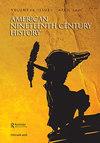Becoming Brahmin: a country boy’s journey to Harvard Yard
IF 0.1
2区 历史学
Q3 HISTORY
引用次数: 0
Abstract
ABSTRACT James Bradley Thayer emerged from humble origins to become a Harvard professor and bona fide member of the Boston Brahmins. His unlikely rise into the Boston elite suggests that the conventional depiction of Brahmin exclusivity requires greater nuance; upward mobility was a real possibility. Just the same, Thayer’s success tacitly gestures toward the limitations on that mobility. His Anglo-Saxon ethnicity, Unitarian affiliation, and male gender all facilitated his entry into rarefied circles. Gatekeepers of the Brahmin caste were amenable to newcomers whose identities sufficiently matched their own. Given the outsized influence that Brahmins enjoyed in nineteenth-century America, the stakes of that gatekeeping were national in character.成为婆罗门:一个乡下男孩的哈佛之旅
詹姆斯·布拉德利·塞耶出身卑微,后来成为哈佛大学教授和真正的波士顿婆罗门成员。他不太可能成为波士顿精英,这表明对婆罗门排他性的传统描述需要更大的细微差别;向上流动确实是可能的。同样,塞耶的成功也默认了这种流动性的局限性。他的盎格鲁-撒克逊种族、一神教信仰和男性都为他进入贵族圈子提供了便利。婆罗门种姓的守门人对身份与自己完全匹配的新来者很顺从。考虑到婆罗门在19世纪的美国所享有的巨大影响力,这种守门的利害关系是国家性质的。
本文章由计算机程序翻译,如有差异,请以英文原文为准。
求助全文
约1分钟内获得全文
求助全文

 求助内容:
求助内容: 应助结果提醒方式:
应助结果提醒方式:


